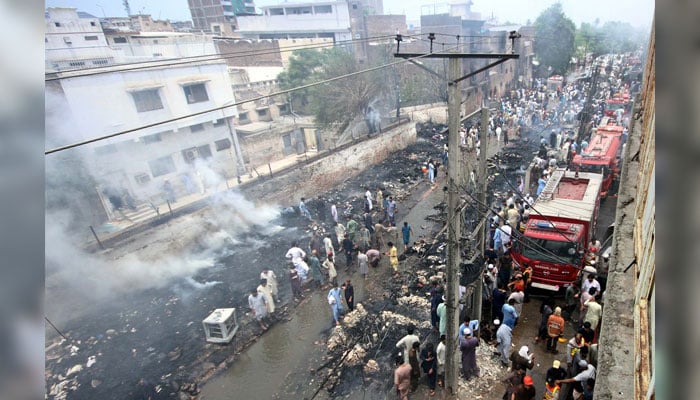What KP needs
One can start by answering with what Khyber Pakhtunkhwa certainly does not need: more violence, more chaos, more petty politics. Which is why the rumblings of political intrigue in KP could not have come at a worse time. With the province reeling from mounting security challenges, tragic incidents and deepening public grievances, reports of a possible no-confidence motion against Chief Minister Ali Amin Gandapur are both ill-timed and deeply irresponsible -- if true. Though the federal PML-N-led government has denied plotting to remove the PTI-led KP administration, the optics of a meeting between Prime Minister Shehbaz Sharif and KP Governor Faisal Karim Kundi -- followed by suggestive statements -- have fueled speculation. CM Gandapur’s fiery press conference and the governor's warning that a no-confidence vote is possible if opposition numbers align have only escalated the drama. Technically, such a move may be within constitutional bounds, but the timing and motivations behind it raise troubling questions.
One thing is clear: political instability in KP right now is not just a political issue but a matter of national security. In just the past week, a bomb blast in Bajaur killed five, including Assistant Commissioner Nawagai Faisal Ismail. Just days earlier, 13 soldiers were martyred in a suicide bombing in North Waziristan. The province remains a frontline in Pakistan’s ongoing battle against terrorism. In such an environment, any move that undermines the continuity of governance -- especially one driven by power calculations rather than genuine democratic necessity -- is both reckless and dangerous. Observers have rightly noted that despite the reinstatement of reserved seats that reduced the PTI’s margin in the provincial assembly, the party still enjoys a comfortable majority. This means any successful no-confidence move would likely rely on horse-trading, inducements, or coercion -- tactics that betray the spirit of democracy (or whatever is left of it). Thankfully, some political voices including those of Maulana Fazlur Rehman and Aimal Wali Khan have rejected any role in such undemocratic maneuvering. Their stance must be commended and echoed across party lines.
What is perhaps most concerning is that, while headlines are dominated by this political theatre, real issues are being ignored. From the tragic drowning of tourists in the Swat River to sectarian tensions in Kurram, to grievances over civilian casualties in counterterrorism operations, KP is brimming with challenges that demand urgent attention. Yet, what we see is political grandstanding and whispers of protests, not governance. It is time for political leaders -- especially those in the PTI -- to prioritise what truly matters. Instead of preparing protest movements, the party that governs KP should be leading the charge against terrorism, addressing sectarian unrest and improving disaster response mechanisms. The federal government, for its part, should abandon any plans -- real or perceived -- of toppling the provincial administration through backroom deals. KP does not need more uncertainty. It needs cooperation between the centre and the province, a singular focus on public safety and a pause in partisan rivalry. If there is one lesson history has taught us, it is that political games played in conflict zones do not end well -- not for the politicians and certainly not for the people. This is the moment for Pakistan’s political class to show maturity. Let Gandapur govern and hold him accountable through performance not by plotting.
-
 Eric Dane's Girlfriend Janell Shirtcliff Pays Him Emotional Tribute After ALS Death
Eric Dane's Girlfriend Janell Shirtcliff Pays Him Emotional Tribute After ALS Death -
 King Charles Faces ‘stuff Of The Nightmares’ Over Jarring Issue
King Charles Faces ‘stuff Of The Nightmares’ Over Jarring Issue -
 Sarah Ferguson Has ‘no Remorse’ Over Jeffrey Epstein Friendship
Sarah Ferguson Has ‘no Remorse’ Over Jeffrey Epstein Friendship -
 A$AP Rocky Throws Rihanna Surprise Birthday Dinner On Turning 38
A$AP Rocky Throws Rihanna Surprise Birthday Dinner On Turning 38 -
 Andrew Jokes In Hold As BAFTA Welcomes Prince William
Andrew Jokes In Hold As BAFTA Welcomes Prince William -
 Sam Levinson Donates $27K To Eric Dane Family Fund After Actor’s Death
Sam Levinson Donates $27K To Eric Dane Family Fund After Actor’s Death -
 Savannah Guthrie Mother Case: Police Block Activist Mom Group Efforts To Search For Missing Nancy Over Permission Row
Savannah Guthrie Mother Case: Police Block Activist Mom Group Efforts To Search For Missing Nancy Over Permission Row -
 Dove Cameron Calls '56 Days' Casting 'Hollywood Fever Dream'
Dove Cameron Calls '56 Days' Casting 'Hollywood Fever Dream' -
 Prince William, Kate Middleton ‘carrying Weight’ Of Reputation In Epstein Scandal
Prince William, Kate Middleton ‘carrying Weight’ Of Reputation In Epstein Scandal -
 Timothée Chalamet Compares 'Dune: Part Three' With Iconic Films 'Interstellar', 'The Dark Knight' & 'Apocalypse Now'
Timothée Chalamet Compares 'Dune: Part Three' With Iconic Films 'Interstellar', 'The Dark Knight' & 'Apocalypse Now' -
 Little Mix Star Leigh-Anne Pinnock Talks About Protecting Her Children From Social Media
Little Mix Star Leigh-Anne Pinnock Talks About Protecting Her Children From Social Media -
 Ghislaine Maxwell Is ‘fall Guy’ For Jeffrey Epstein, Claims Brother
Ghislaine Maxwell Is ‘fall Guy’ For Jeffrey Epstein, Claims Brother -
 Timothee Chalamet Rejects Fame Linked To Kardashian Reality TV World While Dating Kylie Jenner
Timothee Chalamet Rejects Fame Linked To Kardashian Reality TV World While Dating Kylie Jenner -
 Sarah Chalke Recalls Backlash To 'Roseanne' Casting
Sarah Chalke Recalls Backlash To 'Roseanne' Casting -
 Pamela Anderson, David Hasselhoff's Return To Reimagined Version Of 'Baywatch' Confirmed By Star
Pamela Anderson, David Hasselhoff's Return To Reimagined Version Of 'Baywatch' Confirmed By Star -
 Willie Colón, Salsa Legend, Dies At 75
Willie Colón, Salsa Legend, Dies At 75




